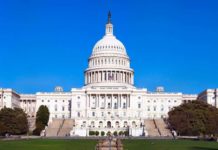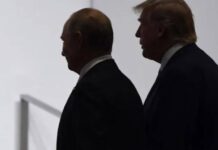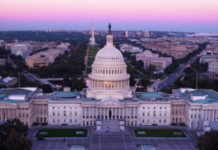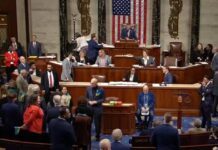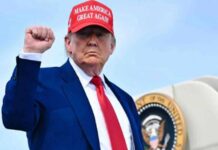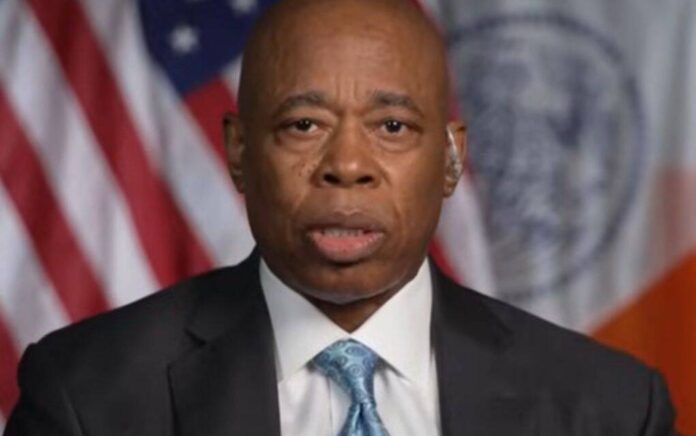
The Democrat Party is in disarray. Their leadership is falling apart at the seams.
And now Piers Morgan put a top Democrat on the hot seat with a question that silenced the room.
Democrat Mayor’s Trump Flirtation Signals Party’s Identity Crisis
New York City Mayor Eric Adams, a lifelong Democrat, has found himself in an awkward dance with the Republican Party, raising questions about the Democratic leadership’s ability to hold its own in a shifting political landscape. In a recent appearance on “Piers Morgan Uncensored,” British journalist Piers Morgan pressed Adams on his apparent coziness with President Donald Trump, asking point-blank why he doesn’t “go the whole hog” and “become a Republican.” The exchange laid bare a growing unease within the Democratic Party, where leaders like Adams seem increasingly untethered from the party’s core, leaving voters to wonder if the party can still define itself.
Adams’ decision to bypass the Democratic mayoral primary and run as an independent in his 2025 reelection bid is a bold move that speaks volumes about his disillusionment with the party’s direction. By appealing “directly to all New Yorkers,” as he announced in April, Adams is betting on a coalition that transcends party lines. But Morgan’s question cut to the heart of the matter: “If you’re so supportive of so much of what Trump is doing, why not go the whole hog and just run as a Republican?” The mayor’s flirtation with Trump’s policies, from border security to economic priorities, suggests a pragmatic streak that clashes with the progressive ideals the Democratic Party claims to champion.
The mayor’s response to Morgan was sharp, almost defensive. “It’s really interesting. I’ve watched many of your shows, and I really have never seen you do this before. Why are you trying to interpret what my position is? I’m not in alignment with anyone 100%. I’m in alignment with protected New Yorkers,” Adams snapped. His insistence on independence rings hollow when his actions—praising Trump’s policies and expressing eagerness to “partner” with the Trump administration—suggest a deeper ideological drift. For a party already struggling to unify its progressive and moderate wings, Adams’ public waffling is a liability.
Adams’ criticism of New York City’s sanctuary city policies, which began in February 2024, further complicates his standing within the Democratic Party. His outspoken frustration with migrant laws, coupled with his pleas to the Biden-Harris administration for federal aid in December 2023, exposed a rift between local Democratic leaders and the national party. As thousands of migrants arrived in New York due to record-high border encounters, Adams joined other Democratic mayors in demanding action, only to be met with what he saw as inadequate support. This public break from party orthodoxy signals a leadership vacuum that the Democrats seem ill-equipped to address.
Morgan didn’t let Adams off easily, pointing out the electoral risks of his independent run. “It seems to me that running as an independent, you’re going to be carving up the vote with Andrew Cuomo, who wants to be mayor,” Morgan said. “I could see your vote getting split. I think you’ve said this, that that’s a concern.” The specter of a fractured vote looms large, and Adams’ refusal to fully embrace either party could alienate voters who crave clarity. For a Democratic Party already reeling from recent electoral losses, the prospect of losing a stronghold like New York City to internal division is a grim one.
Adams’ alignment with Trump, however partial, is not just rhetorical. In November 2024, after Trump’s election win, Adams told Fox News he was “looking forward” to “partnering” with the Trump administration on key issues. This eagerness to collaborate with a figure many Democrats view as anathema raises questions about the mayor’s loyalty to the party that elevated him to notoriety in American politics.
“I don’t think there was anything I said on this interview that gave you the impression that I’m completely in alignment with anyone. I was aligned with what President Biden did that was correct. I’m aligned with whatever President Trump do[es] that’s correct,” Adams said, doubling down on his pragmatic stance. But pragmatism can look like opportunism in a party desperate for unity.
The mayor’s legal troubles add another layer of skepticism about his leadership and the Democratic Party’s judgment. In September 2024, Adams faced a five-count federal indictment tied to alleged illegal contributions to his 2021 campaign. The charges were dismissed “without prejudice” in April 2025 by U.S. District Judge Dale E. Ho, following a directive from Trump’s Department of Justice. While Adams escaped immediate consequences, the case could resurface, casting a shadow over his reelection bid. For a party that prides itself on ethical governance, backing a figure with such baggage is a risky proposition.
Adams’ insistence on fighting for New Yorkers, regardless of party, is a refrain he leans into heavily. “My job as a mayor of this city is to make sure I fight on behalf of mayors. If I was in complete alignment, we would not have been fighting to get our 80 million dollars back that was clawed back,” he told Morgan. Yet this rhetoric of independence feels less like principled leadership and more like a calculated hedge. As the Democratic Party grapples with its identity post-2024, leaders like Adams, who seem more comfortable straddling the fence than staking a claim, risk eroding the party’s credibility.
The mayor’s trajectory is a microcosm of the Democratic Party’s larger struggles. With progressive policies facing backlash and moderate voters drifting toward Republican promises of stability, leaders like Adams are caught in a bind. His willingness to praise Trump while still claiming Democratic roots exposes a party that lacks a cohesive vision. As Adams navigates his independent campaign, the Democratic leadership must confront an uncomfortable truth: if even their own mayors are looking elsewhere for inspiration, the party’s future hangs in the balance.
For now, Adams remains a Democrat in name, but his actions tell a different story. His public embrace of Trump’s policies, coupled with his rejection of the Democratic primary, suggests a party failing to inspire loyalty in its ranks.


